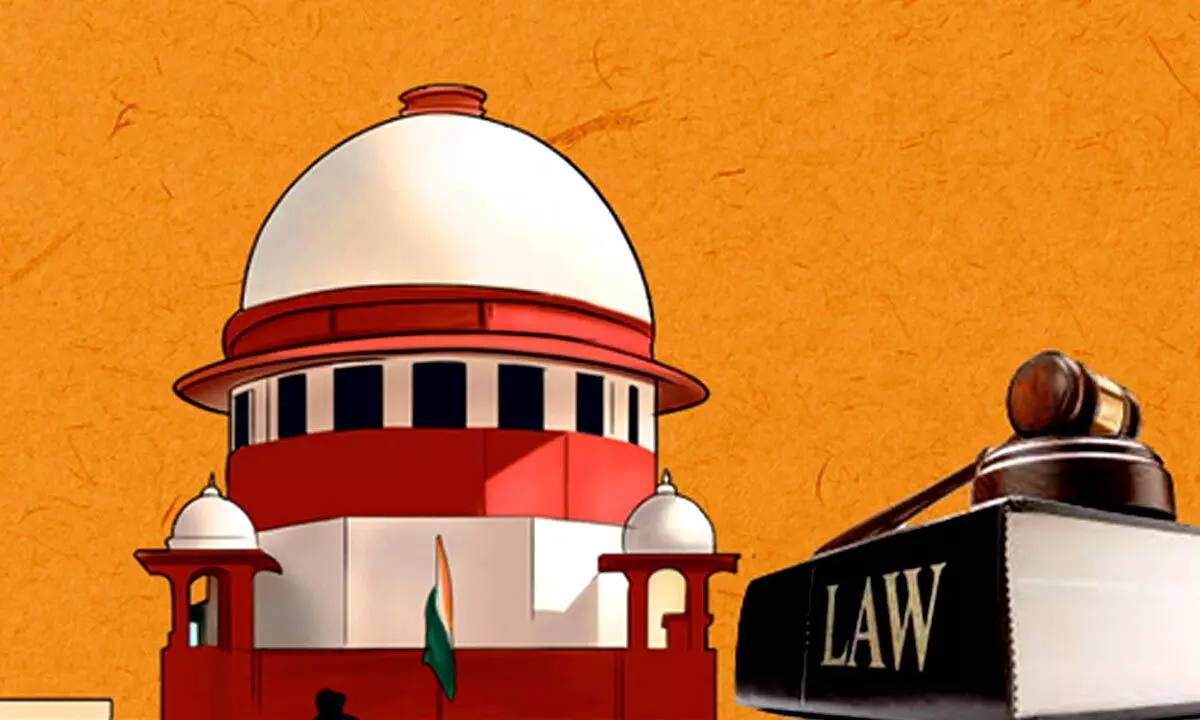Live
- Improvement in Sriteja's Health Condition; Ventilator Removed and Liquid Diet Administered
- Former SC judge V. Ramasubramanian appointed as NHRC Chairperson
- Shyam Benegal: A true inspiration for aspiring film-makers
- Heavy snow forecast in Japan through Tuesday
- Legendary film-maker Shyam Benegal is no more
- Hackers steal over $12.7 billion in over 1,000 crypto heists to date
- BGT: 'Rohit is short of confidence with self-doubts', opines Manjrekar
- Gold gains 30 pc in 2024, silver 35 pc up on COMEX this year: MOFSL
- Delhi HC dismisses anticipatory bail plea of ex-IAS trainee officer Puja Khedkar
- Untouched Goa Beaches You Must Visit in January
Just In

The Supreme Court has said that a bank is duty bound to follow the provisions of the law as any other litigant.
New Delhi: The Supreme Court has said that a bank is duty bound to follow the provisions of the law as any other litigant.
A bench of CJI D.Y. Chandrachud and Justice JB Pardiwala said that a bank and its authorised officer appointed under Section 13(2) of SARFAESI (Securitisation and Reconstruction of Financial Assets and Enforcement of Security Interest) Act cannot act in a manner so as to keep the sword hanging on the neck of the auction purchaser.
"The law treats everyone equally and that includes the bank and its officers. The said enactments were enacted for speedy recovery and for benefitting the public at large and does not give any license to the bank officers to act de hors the scheme of the law or the binding verdicts," the bench held.
In the instant case, the borrowers had availed a credit facility in 2017 to the tune of Rs 100 crore from the bank.
An amount of Rs 65 crore was adjusted against the existing LRD (Lease Rental Discounting) facility and the balance amount of Rs 35 crore in the form of a simple mortgage as a security.
The bank issued a demand notice under SARFAESI Act, 2002 after the borrower defaulted in repayment and decided to put the secured asset to auction.
In the meantime, the borrowers preferred a securitisation application challenging the demand notice and quashing of sale notice. The bank decided to go for auction at a reserve price of Rs 105 crore and in June, the appellant submitted its bid of Rs 105.05 crore, along with a deposit of Rs 10.5 crore as earnest money.
"Later, the Bank sent a 'Sale Confirmation Letter' declaring him as the highest bidder and asked for a deposit of 25 per cent of the total bid amount."
In the wake of such development, the borrowers sought redemption of the mortgage by payment of the total outstanding sum of Rs 123.83 crore.
As on April 2023, a sum of Rs 123.83 crore was due and payable by the borrower to the bank. While the parties were awaiting for the DRT to pass orders, borrowers approached the High Court seeking directions to the Bank to permit them to redeem the mortgage by offering 129 crore.
"The bank, which had earlier opposed the plea for redemption of mortgage before the DRT for some good reason, expressed its willingness before the High Court to accept the offer of the borrowers. The bank perhaps got lured by the fact that the borrowers were paying almost Rs 23.95 crore more than what was paid by the appellant herein and Rs 5 crore more than the outstanding amount," noted the Supreme Court.
In August this year, the High Court "allowed the writ petition and permitted the borrowers to redeem the mortgage of the secured asset subject to payment of Rs 25 crore on the same day and the balance amount of Rs 104 crore on or before 31.08.2023, failing which the sale of secured asset in favour of the appellant herein would be confirmed".
Being aggrieved and dissatisfied with the above order passed by the High Court, the appellant preferred a special leave petition before the Supreme Court.
In its judgment, the top court ordered that "the respondent Bank shall refund the entire amount deposited by the borrowers i.e., an amount of Rs.129 crore paid by them in lieu of the redemption of mortgage of the secured asset at the earliest. The appellant herein shall pay an additional amount of Rs 23.95 crore to the Bank within a period of one week from today and subject to such deposit, the Bank shall issue the sale certificate in accordance with Rule 9(6) of the Rules of 2002."

© 2024 Hyderabad Media House Limited/The Hans India. All rights reserved. Powered by hocalwire.com






